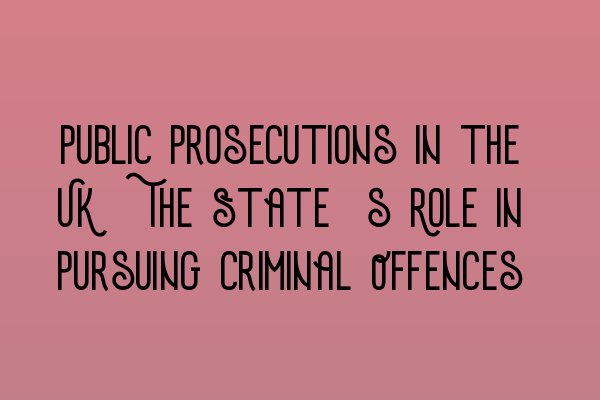Public Prosecutions in the UK: The State’s Role in Pursuing Criminal Offences
Welcome to SQE Criminal Law & Practice Law UK, where we provide comprehensive information and resources related to
criminal law in the United Kingdom. In this blog post, we will delve into the topic of public prosecutions and
explore the state’s role in pursuing criminal offences.
When a criminal offence is committed, it is the responsibility of the state to initiate and carry out the
prosecution. The state acts on behalf of society to uphold the rule of law and ensure that justice is served. The
aim of public prosecutions is to hold individuals accountable for their actions and to deter others from engaging
in criminal behaviour.
The Crown Prosecution Service (CPS) is the principal public prosecutor in England and Wales. They are responsible
for reviewing the evidence gathered by law enforcement agencies and making a decision on whether to pursue a
criminal charge. The CPS operates independently from the police and other investigative bodies to maintain the
integrity of the prosecution process.
The Role of the Crown Prosecution Service (CPS)
The CPS plays a crucial role in the criminal justice system by ensuring that prosecutions are conducted fairly and
effectively. Their role involves:
- Reviewing evidence: The CPS carefully examines the evidence gathered by the police or other investigative
bodies to determine whether there is sufficient evidence to bring charges. They assess the strength of the
evidence and consider its admissibility in court. - Making charging decisions: Based on the evidence, the CPS decides whether to proceed with charging the
suspect(s) with a criminal offence. They consider the public interest, the seriousness of the offence, and the
likelihood of securing a conviction. - Preparing the case: If charges are brought, the CPS prepares the case for court. This includes gathering
additional evidence, interviewing witnesses, and engaging with the defence team. - Presenting the case in court: The CPS represents the state’s interests in court and presents the evidence and
legal arguments to support the prosecution. They work alongside the police and other relevant agencies to
ensure a robust courtroom presentation.
Throughout the prosecution process, the CPS is guided by the Code for Crown Prosecutors. This code sets out the
principles that must be followed, including the requirement to consider whether there is a realistic prospect of
conviction and whether prosecution is in the public interest.
The Importance of Skilled Criminal Prosecutors
Effective public prosecutions require skilled and knowledgeable criminal prosecutors who can navigate the complex
legal system. Aspiring lawyers interested in criminal law can benefit from comprehensive SQE 1 and SQE 2
preparation courses offered by SQE Criminal Law & Practice Law UK. These courses provide a solid foundation in
criminal law principles and practical skills necessary for a successful career in criminal prosecution.
For individuals planning to take the SQE exams, it is crucial to practice with SQE 1 mock exams and SQE 1 practice
exam questions to enhance their understanding and test their knowledge. These resources can be found on our website
along with information about the upcoming SRA SQE exam dates.
To enhance your understanding of criminal law and the state’s role in public prosecutions, we also recommend
exploring our related articles:
- SQE 1 Practice Exam Questions
- SQE 1 Practice Mocks FLK1 FLK2
- SQE 2 Preparation Courses
- SQE 1 Preparation Courses
- SRA SQE Exam Dates
By accessing these articles, you can broaden your knowledge and gain insights into different aspects of criminal law
and the legal profession.
At SQE Criminal Law & Practice Law UK, we are dedicated to providing valuable resources and expert guidance for
individuals interested in criminal law. Stay tuned for more informative blog posts and updates on the latest
developments in criminal prosecutions.
Disclaimer: The information provided in this blog post is for educational purposes only and should not be
considered legal advice. For specific legal questions or concerns, it is advisable to consult with a qualified
solicitor.
